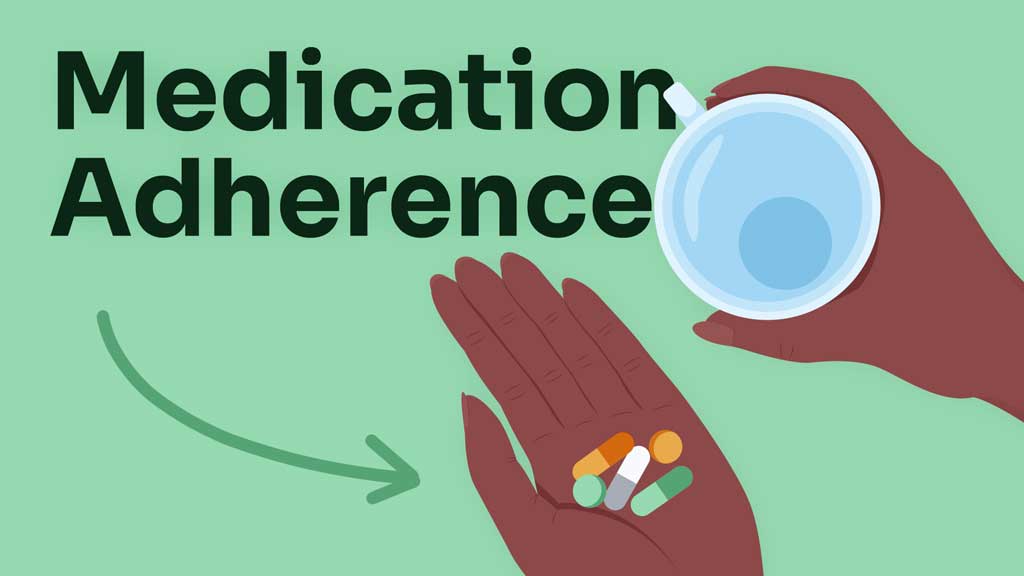Studies suggest that about 50% of people living with chronic illness stop taking their prescribed medicines within 12 months. Furthermore, up to 30% of prescriptions are never filled at all (Cutler et al. 2019).
Not only does medicine non-adherence have clinical consequences such as disease progression, morbidity and mortality - but it also results in higher costs and increased use of healthcare resources (Cutler et al. 2019).
What is Medication Adherence?
Medication adherence refers to ‘the extent to which a patient’s medication-taking behaviour and/or execution of lifestyle changes corresponds with agreed recommendations from a healthcare provider’ (FIP 2018).
This includes:
- Taking medicines at the right time
- Taking the right dosages
- Taking medicines at the right intervals
- Taking medicines for the right duration of time.
(Gast & Mathes 2019; FIP 2018)
Optimal therapeutic efficacy generally requires an adherence rate of 80% (Kim et al. 2018).
What is Medication Non-Adherence?
Medication non-adherence, on the other hand, is when a patient does not follow the medicine regimen they have been prescribed.
This might mean:
- Not taking prescribed medicines at all
- Taking medicines differently from how they were instructed
- Taking medicines at the wrong time
- Taking the wrong dosages
- Taking medicines at the wrong intervals
- Taking medicines for the wrong duration of time.
(FIP 2018)
There are two types of non-adherence:
- Intentional non-adherence is a decision made by the patient to deliberately not follow their prescribed treatment. This decision usually reflects the patient’s attitudes, beliefs and concerns about the medicine being recommended and/or their illness.
- Unintentional non-adherence is unplanned by the patient and caused by factors outside of their control, such as forgetfulness, misunderstanding or inability to access medicines.
(Usherwood 2017)

Causes of Medication Non-Adherence
There are a variety of factors that may contribute to both intentional and unintentional non-adherence. These include:
| Intentional Non-Adherence Factors | Unintentional Non-Adherence Factors |
|---|---|
| Perceived necessity of treatment | The complexity of the treatment regimen, especially if the patient has been prescribed medicines for multiple comorbidities |
| Safety concerns | Cognitive impairment |
| Acceptance of disease chronicity | Cost - 7.6% of people delay or never fill their prescription due to cost |
| Beliefs about the effectiveness of treatment | Practical difficulties (e.g. difficulty opening medicine bottles or swallowing tablets) |
| How easy the treatment is to use | Older age, which may cause a decline in memory, mobility and manual dexterity |
| Satisfaction with treatment | Poor eyesight, which makes instructions and labels more difficult to read |
| Opinions of family and friends | Confusion |
| Fear of adverse effects | Not knowing how to use equipment properly (e.g. asthma inhalers) |
| Experience of adverse effects |
(Usherwood 2017; ACSQHC 2020; FIP 2018)
Addressing Intentional Non-Adherence
Interventions used to target intentional non-adherence generally focus on patient education and discussion (Usherwood 2017).
Consultation with the patient upon dispensing a new or repeat prescription is an important way to provide this education - and is the pharmacist’s responsibility (FIP 2018).
This conversation might involve:
- Asking the patient about their concerns, beliefs and preferences related to medicines
- Assessing the patient’s medication adherence
- Helping to resolve any medicine-related issues that have arisen
- Discussing lifestyle factors such as smoking that might affect the use of medicines and the patient’s overall health status
- Finding out whether the patient is having any difficulty obtaining, using or storing medicines
- Finding out whether the patient would prefer their medicines in a different form, if possible (e.g. liquid instead of tablets)
- Informing the patient of any possible side effects or interactions
- Providing information in written form.
(FIP 2018)
As well as ensuring the patient is appropriately educated about their treatment regimen, this conversation will facilitate partnership and shared decision-making - which, in turn, can also encourage adherence (FIP 2018).
Addressing Unintentional Non-Adherence
Strategies to improve unintentional non-adherence might focus on removing barriers and improving the patient’s ability to follow their medicine regimen, for example:
- Prescribing generic brand medicines or lower-cost alternatives where appropriate to reduce the financial burden on patients
- Simplifying the medicine regimen, where possible (e.g. reducing the frequency of administration, using combination medicines, deprescribing)
- Support and/or assistance from a carer
- Reminder packaging, where medicines are repackaged into a device such as a blister pack that displays the date and time medicines need to be taken
- Regular reminders.
(Usherwood 2017)
Medication Prompting
Sometimes, the patient may know which medicines to take and how to take them but forget to actually do so. In these cases, where the patient cannot be relied on to take their medicines on their own, medication prompting might be a useful strategy (Ministry of Health 2019; Care Inspectorate 2015).
Medication prompting involves reminding the patient of the time of day, and then asking them if they are going to take their medicines (Care Inspectorate 2015).
It’s important to remember that the patient needs to self-administer (Medicine Management 2014). They are still in control and can choose not to take their medicine even after being prompted, or can choose to take their medicine later (Care Inspectorate 2015).
Note that medication prompting does not involve:
- Pouring out liquid medicine or taking tablets out of containers
- Physically handling medicines in any way
- Advising the patient about which medicines to take or selecting medicines for them
- Explaining dosage, applying creams or giving injections.
(District 360 2023)

Test Your Knowledge
Question 1 of 3
True or false: Medication prompting does not involve physically handling medicines in any way.
Topics
References
- Australian Commission on Safety and Quality in Health Care 2020, Quality Use of Medicines and Medicines Safety (10th National Health Priority), Australian Government, viewed 24 January 2024, https://www.safetyandquality.gov.au/publications-and-resources/resource-library/quality-use-medicines-and-medicines-safety-discussion-paper
- Care Inspectorate 2015, Prompting, Assisting and Administration of Medication in a Care Setting: Guidance For Professionals, Care Inspectorate, viewed 24 January 2024, https://hub.careinspectorate.com/media/1595/prompt-assist-administer-medication-in-a-care-setting-guidance.pdf
- Cutler, RL et al. 2019, ‘Pharmacist-Led Medication Non-Adherence Intervention: Reducing the Economic Burden Placed on the Australian Health Care System’, Patient Preference and Adherence, vol. 13, viewed 24 January 2024, https://www.ncbi.nlm.nih.gov/pmc/articles/PMC6537038/
- District 360 2023, P028 - Medication Management Policy & Procedure, District 360, viewed 24 January 2024, https://img1.wsimg.com/blobby/go/9c4aaee6-5494-4b70-82e9-f6bc2330418f/downloads/D360S_P028%20Medication%20Management%20Policy%20and%20Pr.pdf?ver=1624432245453
- Gast, A & Mathes, T 2019, ‘Medication Adherence Influencing Factors - An (Updated) Overview of Systematic Reviews’, Systematic Reviews, vol. 8, no. 112, viewed 24 January 2024, https://systematicreviewsjournal.biomedcentral.com/articles/10.1186/s13643-019-1014-8
- International Pharmaceutical Federation 2018, Use of Medicines by the Elderly: The Role of Pharmacy in Promoting Adherence, FIP, viewed 24 January 2024, https://www.fip.org/files/fip/publications/Use_of_medicines_by_the_elderly_The_role_of_pharmacy_in_promoting_adherence.pdf
- Kim, J, Combs, K, Downs, J & Tillman III, F 2018, ‘Medication Adherence: The Elephant in the Room’, US Pharmacist, vol. 43, no. 1, viewed 24 January 2024, https://www.uspharmacist.com/article/medication-adherence-the-elephant-in-the-room
- Medicine Management 2014, Medicine Management - How To Prompt with Medicines, online video, 3 September, viewed 24 January 2024, https://www.youtube.com/watch?v=u0RawVXDWrs
- Ministry of Health 2019, Medication Guidelines for the Home and Community Support Services Sector, New Zealand Government, viewed 24 January 2024, https://www.health.govt.nz/system/files/documents/publications/medication-guidelines-home-community-support-services-sector-may19.pdf
- Usherwood, T 2017, ‘Encouraging Adherence to Long-Term Medication’, Australian Prescriber, vol. 40, no. 4, viewed 24 January 2024, https://www.nps.org.au/australian-prescriber/articles/encouraging-adherence-to-long-term-medication
- WA Country Health Service 2018, Medication Guideline for Direct Care Unregulated Health Workers, Government of Western Australia, viewed 31 January 2022, https://www.wapha.org.au/wp-content/uploads/2018/12/Medication-Guideline-for-Direct-Care-Unregulated-Health-Workers_v1.pdf

